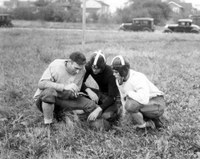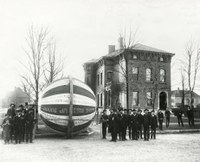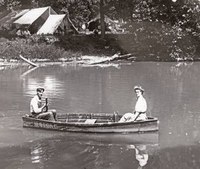
Purchase Tickets
Idiomatic Advice
June 17, 2016

My second grade son recently came home with an interesting school assignment: Prepare a costume for the class idiom fashion show. Need a language arts refresher? An idiom is a word or phrase that is not taken literally. In addition to frustrating non-native English speakers, these figurative phrases cause us to think in pictures. Examples that come to mind include barking up the wrong tree? and biting off more than you can chew.? Or in the case of my son’s assignment, three dog night,? which required only a bath robe and three stuffed animals to be fashion-show ready.
Musing over these colloquialisms got me thinking about how we use these phrases in our everyday lives. I can?t tell you how many times I?ve heard leaders at small organizations comment that they are “drinking from the fire hose? or building the plane while we fly it.? While these particular idioms give us a mental picture of feeling overwhelmed and under prepared, I wondered if it might be possible to turn a few of our favorite idioms into sage words of advice that could be useful to our local history organizations.
So here’s my stab at some idiomatic advice:
Have a game plan: Much like a coach heading into a big game, you need a plan if you want a big win. Planning should be deliberate, but it doesn’t have to be elaborate. Identify your priorities across a timeline that seems reasonable and realistic for your organization. The most important takeaway is that you and your team identify the organization’s priorities and establish some short- and long-term goals.
Get down to brass tacks: Most small organizations must dedicate finite resources to infinite needs. You work hard for the time, money and people committed to your cause. When faced with tough decisions on how to use these resources, remember to focus on the essentials that will advance your mission. Refer back to the priorities outlined in your plan and commit to achieving your most critical objectives.
 Get the ball rolling: Organizations become stagnant when they get complacent and stop innovating. Don’t get too comfortable in your current situation and don’t wait for the perfect time to start a new project or initiative. There is no perfect time. Put a good plan together and then execute it. Plan and do, plan and do. Keep your momentum always rolling forward.
Get the ball rolling: Organizations become stagnant when they get complacent and stop innovating. Don’t get too comfortable in your current situation and don’t wait for the perfect time to start a new project or initiative. There is no perfect time. Put a good plan together and then execute it. Plan and do, plan and do. Keep your momentum always rolling forward.
Fan out: It’s easy to become inwardly focused. We concentrate on the daily work of the organization and sometimes forget that we’re here to serve the people of our communities . We have to remind ourselves to use an outward-facing approach. Consider how your organization serves the public and make sure these benefits can be seen, understood and accessed by your community.
Get the best of both worlds: Local history requires us to straddle the space between two very different worlds. Moving from history to present day and back again is a benefit of the work we do. Our challenge often comes in telling yesterday’s stories in a way that is relevant and meaningful today. Be deliberate in your use of collection pieces, interpretive plans and exhibits to build a bridge between those worlds for your visitors
 And finally, remember…we’re all in the same boat: Challenges can seem overwhelming and sometimes it’s difficult to see beyond the borders of our own communities. But don’t forget there are many other folks doing local history with the same passion and dedication. Seek out compatriots from your local history network and build relationships with people who understand the challenges and joys of keeping a community’s history. Don’t start from scratch your Local History Services team is here to help!
And finally, remember…we’re all in the same boat: Challenges can seem overwhelming and sometimes it’s difficult to see beyond the borders of our own communities. But don’t forget there are many other folks doing local history with the same passion and dedication. Seek out compatriots from your local history network and build relationships with people who understand the challenges and joys of keeping a community’s history. Don’t start from scratch your Local History Services team is here to help!
Do you have any idiomatic advice to add to our list?
________________________________








